-
 Rebooting the Arsenal of Democracy with Palmer Luckey
Rebooting the Arsenal of Democracy with Palmer LuckeyFrom 🇺🇸 a16z Podcast, published at 2023-03-07 11:00
Starting in the 1960s, technology companies, funded by the U.S. Department of Defense, were essential for creating the processors that would eventually launch satellites and guide missiles. Half a century later, today’s tech companies can — and need — to move even faster and smarter, as international adversaries scale up their aggressions. In this episode, Anduril Industries Founder Palmer Luckey will discuss how Silicon Valley is using new technologies to build new tools, systems, and companies to defend our nation and its interests.
-
 The Robot Lawyer Resistance
The Robot Lawyer ResistanceFrom 🇺🇸 a16z Podcast, published at 2023-03-01 13:00
Should AI belong in the courtroom? Joshua Browder ventured to run an experiment where a robot lawyer would defend a court case. Looking to up the ante, he even offered $1m for a Supreme Court hearing! His experiment was met with a threat of 6 months jail time. Listen in for the full story.
-
 The Challenge of Replicating Reality
The Challenge of Replicating RealityFrom 🇺🇸 a16z Podcast, published at 2023-02-22 13:00
What would you do if you believed in an idea but everyone said it would fail, nobody would fund you, and the industry was experiencing a nuclear winter? Despite experiencing exactly that, Sandbox VR founder Steve Zhao doubled down and invested all of his personal savings into the unproven business. 7 years and 1 bankruptcy later, Steve has built the world’s leading full-body VR experience with over 30 locations across the globe. In this interview, we get to chat with Steve about the many challenges he faced, how Sandbox made it through the pandemic, the future of VR, and the difficult task of tackling hardware, software, a new computing platform, and real estate.
-
 The 1000x Developer
The 1000x DeveloperFrom 🇺🇸 a16z Podcast, published at 2023-02-16 13:00
A small minority – likely less than 1% – of the world can code. Yet also widely known that the skillset tends to yield outsized returns, with developers generating some of the highest paying salaries out there. But the field is quickly shifting, especially with the advent of wide-scale AI. In this podcast, we get to chat with Amjad Masad, founder of Replit, about these foundational shifts. We cover how Replit has integrated AI into its platform and the implications on both current and future developers. It’s easier than ever to learn to code, but is it still worthwhile? Listen in to find out.
-
 The State of Apps
The State of AppsFrom 🇺🇸 a16z Podcast, published at 2023-02-09 13:00
A few weeks ago, Apple released a stunning statistic: they’ve paid developers over $320B — yes, billion! — since the launch of the App Store in 2008, highlighting the cast opportunity in the marketplace. And around the same time, a16z Consumer Partner, Olivia Moore, compiled a list of the top apps across the US app store throughout 2022. In this episode, you’ll get to hear which apps made it to the top and what they have in common. Hint: the big winners were in social, but perhaps a new wave of social apps! We also get the scoop on what it really takes to not just hit #1, but stay there. This episode highlights numerous surprising examples ranging from a new-age Beanie Baby app, a viral talking dog, an app from 2012 that finally broke the top 10, and the Chinese app that’s been at #1 for a majority of 2023, and it’s not TIkTok! There are endless learnings about how new founders can take advantage of these opportunities.
-
 Disrupting the World’s Largest Asset Class with Adam Neumann
Disrupting the World’s Largest Asset Class with Adam NeumannFrom 🇺🇸 a16z Podcast, published at 2023-02-07 11:00
Back in August, after a16z announced our investment into Adam Neumann’s new company, Flow, it felt like almost everyone – whether it was other VCs, founders, or journalists – had something to say. But the one person that you didn’t hear from was Adam himself. In this never-before shared footage from a16z’s American Dynamism Summit in Washington DC, Adam Neumann sits down with Marc Andreessen and David Ulevitch, to discuss the opportunities that have emerged from post-pandemic shifts in both work and home, and what Flow is doing to capitalize. Find the full library of American Dynamism Summit recordings at a16z.com/ad-summit.
-
 Healthspan, Lifespan, and the Biology of Aging
Healthspan, Lifespan, and the Biology of AgingFrom 🇺🇸 a16z Podcast, published at 2023-02-03 11:00
In this cross-over episode from Bio Eats World, Kristen Fortney, cofounder and CEO of BioAge, joins Vijay Pande, founding partner of a16z Bio + Health, and Olivia Webb, editorial lead, to discuss the biology of aging, how she started a company, and some fun things — like how long a hypothetical venture capitalist can expect to live.
-
 2023 Big Ideas in Technology (Part 2)
2023 Big Ideas in Technology (Part 2)From 🇺🇸 a16z Podcast, published at 2023-01-27 13:00
At the end of 2022, our team at a16z asked dozens of partners across the firm to spotlight one big idea that startups in their fields could tackle in 2023. Emerging from this exercise came 40+ builder-worthy pursuits for the year, ranging from entertainment franchise games to precision delivery of medicine to small modular reactors, and of course loads of AI applications. In our 2-part series, we’ll be covering 12 of these big ideas with the partners that shared them. Here in part 2, we’ll cover Fintech, American Dynamism, and Bio & Health. Listen in as we chat with Anish Acharya, Angela Strange, Michelle Volz, Ryan McEntush, Vijay Pande, and Julie Yoo. And for the full list of 40+ ideas, check out the full article: https://a16z.com/2022/12/15/big-ideas-in-tech-2023/ Topics Covered: (0:59) GPT Unlocks Credit Counseling - Anish Acharya (9:53) Compliance as a Competitive Advantage - Angela Strange (23:31) Small Modular Reactors Advance the Nuclear Renaissance - Michelle Volz (33:48) Overhauling the Space Supply Chain - Ryan McEntush (44:40) The Biggest Company in the World - Vijay Pande (51:17) The Value-Based Care Stack - Julie Yoo
-
 2023 Big Ideas in Technology (Part 1)
2023 Big Ideas in Technology (Part 1)From 🇺🇸 a16z Podcast, published at 2023-01-24 12:30
At the end of 2022, our team at a16z asked dozens of partners across the firm to spotlight one big idea that startups in their fields could tackle in 2023. Emerging from this exercise came 40+ builder-worthy pursuits for the year, ranging from entertainment franchise games to precision delivery of medicine to small modular reactors, and of course loads of AI applications. In our 2-part series, we’ll be covering 12 of these big ideas with the partners that shared them. Here in part 1, we’ll cover Consumer, Games, and Enterprise, with a little Fintech sprinkled in. Listen in as we chat with Connie Chan, Anne Lee Skates, Jack Soslow, Doug McCracken, Sarah Wang, and Sumeet Singh. And look out for part 2 dropping soon, covering Fintech, American Dynamism, and Bio & Health! And for the full list of 40+ ideas, check out the full article: https://a16z.com/2022/12/15/big-ideas-in-tech-2023/ Topics Covered: (1:30) Breakthroughs in Buying (Finally!) - Connie Chan (16:40) Unlocking the “Third Place” - Anne Lee Skates (30:14) Games as a Neverending Turing Test - Jack Soslow (46:09) The Metaverse Goes Fashion Forward - Doug McCracken (59:24) Generative AI Advances Beyond “Text to Image” to Complex Workflows - Sarah Wang (1:12:23) Embracing Large Language Models and Maintaining Trust - Sumeet Singh
-
 The Human Behind the Genius
The Human Behind the GeniusFrom 🇺🇸 a16z Podcast, published at 2023-01-19 13:00
In this special episode, we share never heard before footage from Steve Wozniak alongside his cofounder and best man, Alex Fielding. Listeners get an inside look into what drove Woz to building a computer, but also how Steve’s zest for life was applied beyond computers – from the rare opportunity to play Tetris on the side of a building or throw a concert across borders.
-
 Building for Tomorrow
Building for TomorrowFrom 🇺🇸 a16z Podcast, published at 2023-01-12 13:00
New year, new you! Right? Well, as much as we’d all like to believe that we embrace the new… the reality is that we often resist change. That’s why we’ve brought in someone who has studied how humans respond to and adapt to change – or sometimes how we fail to. That person is Jason Feifer – long-time editor in chief at Entrepreneur Magazine, host of two popular podcasts, and recent author of his book Build for Tomorrow. Today, Jason shares 6 specific frameworks around the very natural human responses to change, which he’s developed through interviewing and studying some of the most influential people in the world – past and present. We also play a fun game at the end, where Jason comments on current technologies encountering pushback, and assesses where they might fit into his framework.
-
 Expert AI as a Healthcare Superpower
Expert AI as a Healthcare SuperpowerFrom 🇺🇸 a16z Podcast, published at 2023-01-10 11:00
In this episode, Marc Andreessen and Vijay Pande discuss expert AI and its role in healthcare, bio, and more.
-
 Creators, Creativity, and Technology with Bob Iger
Creators, Creativity, and Technology with Bob IgerFrom 🇺🇸 a16z Podcast, published at 2023-01-06 11:00
with @robertiger @cdixon @smc90 A wide-ranging conversation with Bob Iger on the interplay between technology, content, and distribution; as well as Bob’s journey -- and that of various creators! -- especially as the industry evolved from TV and cable to the advent of the internet/ web 1.0 to 2.0 to briefly touching on web3 and other emerging technologies. As well as topics top of mind for all company and community builders: from build vs. buy and the innovator's dilemma, to managing creativity, decentralization, remote work, and much more.
-
 Best Clips of 2022
Best Clips of 2022From 🇺🇸 a16z Podcast, published at 2022-12-27 14:00
We’ve had some incredible guests join us on the a16z podcast this year, ranging from moonshot entrepreneurs, to top creators, to some of the most forward thinking technologists – all of which are busy shaping the future right before our eyes… We have so much more in store for 2023 and cannot wait for you to see who we bring on as guests. But before we turn the page, we wanted to recap some of the most interesting, thought-provoking segments from our 2022 roster. Here are 8 of our favorite clips, covering topics from AI to space to the metaverse… and beyond.
-
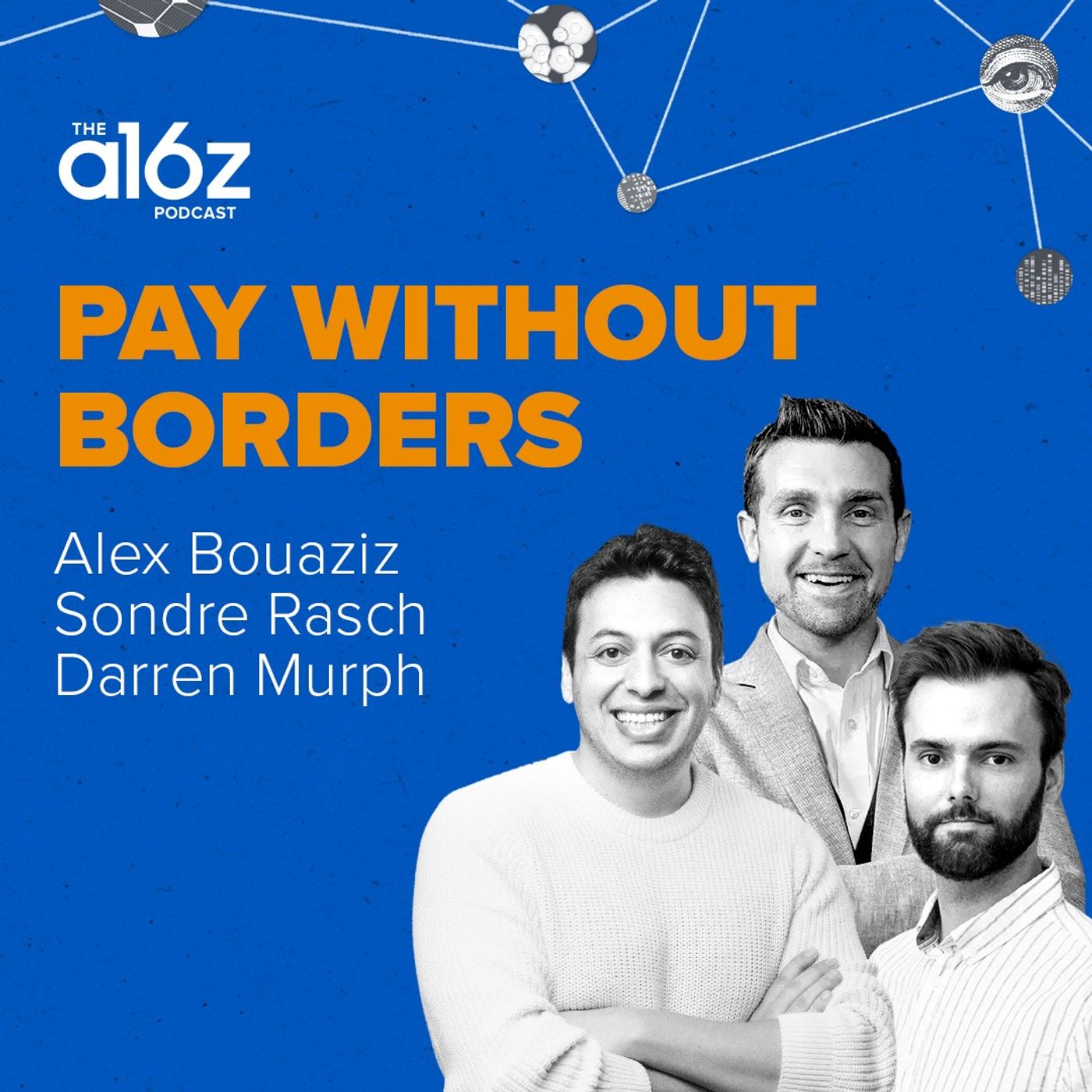 Pay Without Borders with Deel, GitLab, and Safetywing
Pay Without Borders with Deel, GitLab, and SafetywingFrom 🇺🇸 a16z Podcast, published at 2022-12-20 11:00
It’s been a century since the 40-hour work week was adopted, and decades since wifi has appeared on the scene. Despite countless new technologies fundamentally changing how we can work, many work practices have remained the same. COVID sent a shock into that system and many are left debating what the future of work holds. So in this episode, we speak with Alex Bouaziz, Darren Murph, and Sondre Rasch about the many ways companies are now being forced to adapt. Will companies shift toward more asynchronous work? How will a distributed model shift the way we hire? How will companies attract top talent, and is remote the only benefit that matters? What workers and companies will come out on top of this sea change? And of course… is the office dead? We’ll address these questions and more.
-
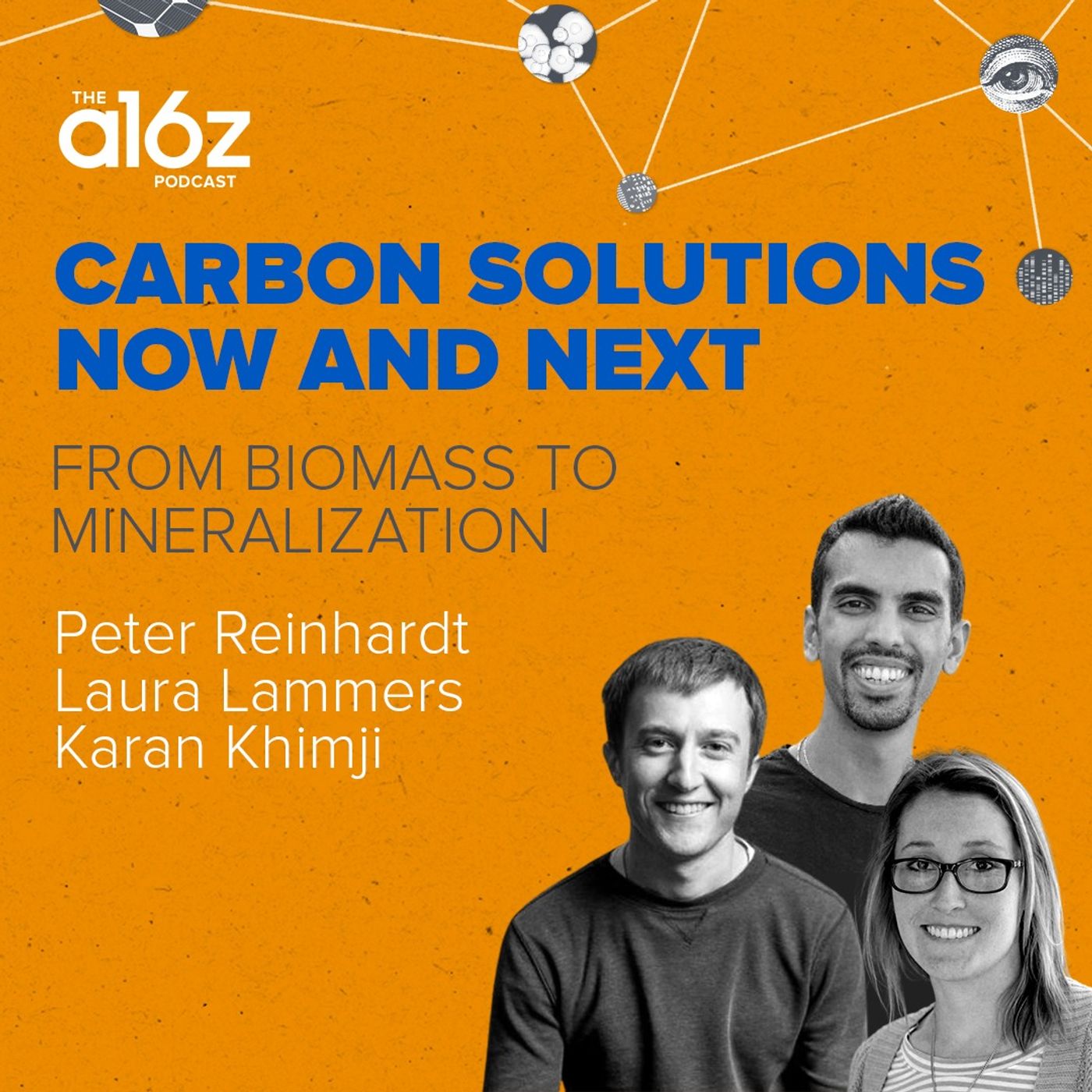 Carbon Solutions Now and Next: From Biomass to Mineralization
Carbon Solutions Now and Next: From Biomass to MineralizationFrom 🇺🇸 a16z Podcast, published at 2022-12-13 14:00
In this episode, we tackle three carbon removal projects of varying scale, business models, and technical challenges. -Biomass pyrolysis via Charm Industrial -An electrochemical process via Travertine -Mineralization via 44.01 We cover these companies through the lens of their founders – Peter Reinhardt (CEO of Charm Industrial), Laura Lammers (CEO of Travertine), and Karan Khimji (COO of 44.01) – who share the fascinating stories of how they stumbled into this industry, how their processes work, whether they can economically scale, and ultimately why each of them is dedicating their time and energy to this field. This episode also closes out our carbon removal mini series, where we’ve seen a unique convergence of attention, capital, policy, and creativity being applied. With that combination, it's rare that humans don't surprise one another in progress.
-
 Ben Horowitz and Brian Armstrong on Building and Overcoming the Hard Things
Ben Horowitz and Brian Armstrong on Building and Overcoming the Hard ThingsFrom 🇺🇸 a16z Podcast, published at 2022-12-08 14:00
If you’ve been following the news, you’ve probably heard of the recent FTX scandal. While there’s much still unknown, in this episode we get the unique opportunity to hear from Brian Armstrong – co-founder and CEO of Coinbase – about what’s top of mind for the crypto industry. That includes the impact of this current event on future regulation, how this crypto winter might be different from previous ones, founder psychology during downturns, the transparency that comes with being public, and much more. Brian is interviewed by a16z cofounder and general partner Ben Horowitz, who has the unique perspective of having invested in, built, and been on the board of numerous companies during the ups and downs, leading him to his well-known book The Hard Thing About Hard Things.
-
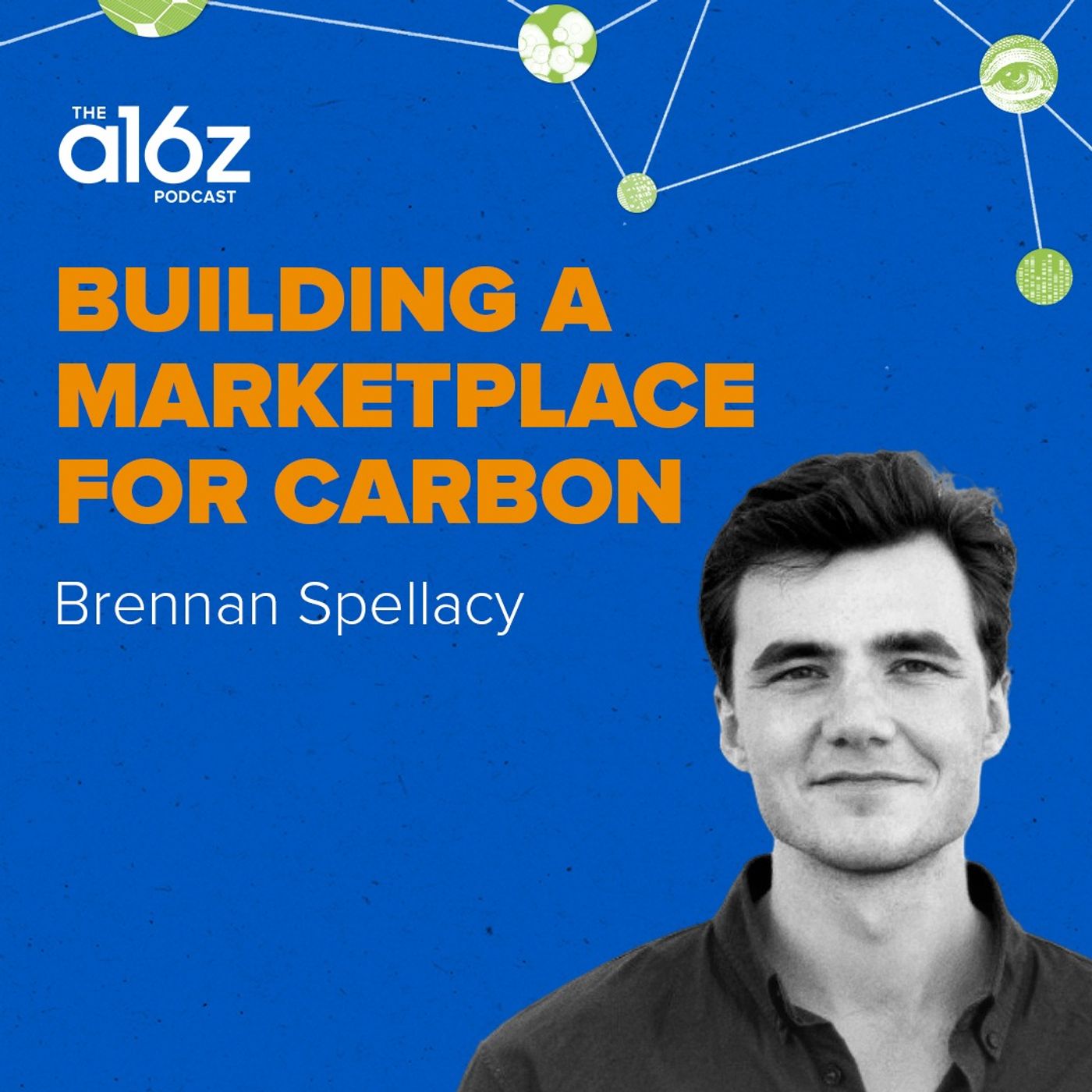 Building a Marketplace for Carbon
Building a Marketplace for CarbonFrom 🇺🇸 a16z Podcast, published at 2022-12-06 15:00
In part 1 of our carbon removal series, we talked to Nan Ransohoff — Head of Climate at Stripe — about what it might take to jumpstart the market of carbon removal solutions. But what happens when there is a true, thriving market of buyers and sellers? How will suppliers effectively reach the right buyers, and as more solutions become available, how will buyers effectively vet the options? In part 2, we address these questions and more, together with Brennan Spellacy, co-founder & CEO of Patch – a growing marketplace for carbon credits. We also cover many evolving market dynamics, like the potential differences between two sets of tons delivered, the opportunity and challenge of effectively educating buyers, the integration of software like Patch's API, verification solutions and their current limitations, how even the voluntary market is being held accountable for their carbon claims, and the role that Patch is playing to help develop this nascent industry. By the way, if you like this episode, be sure to look out for part 3 of our series where we get into the nitty gritty of 3 emerging carbon removal solutions — ranging from biomass pyrolysis to carbon mineralization.
-
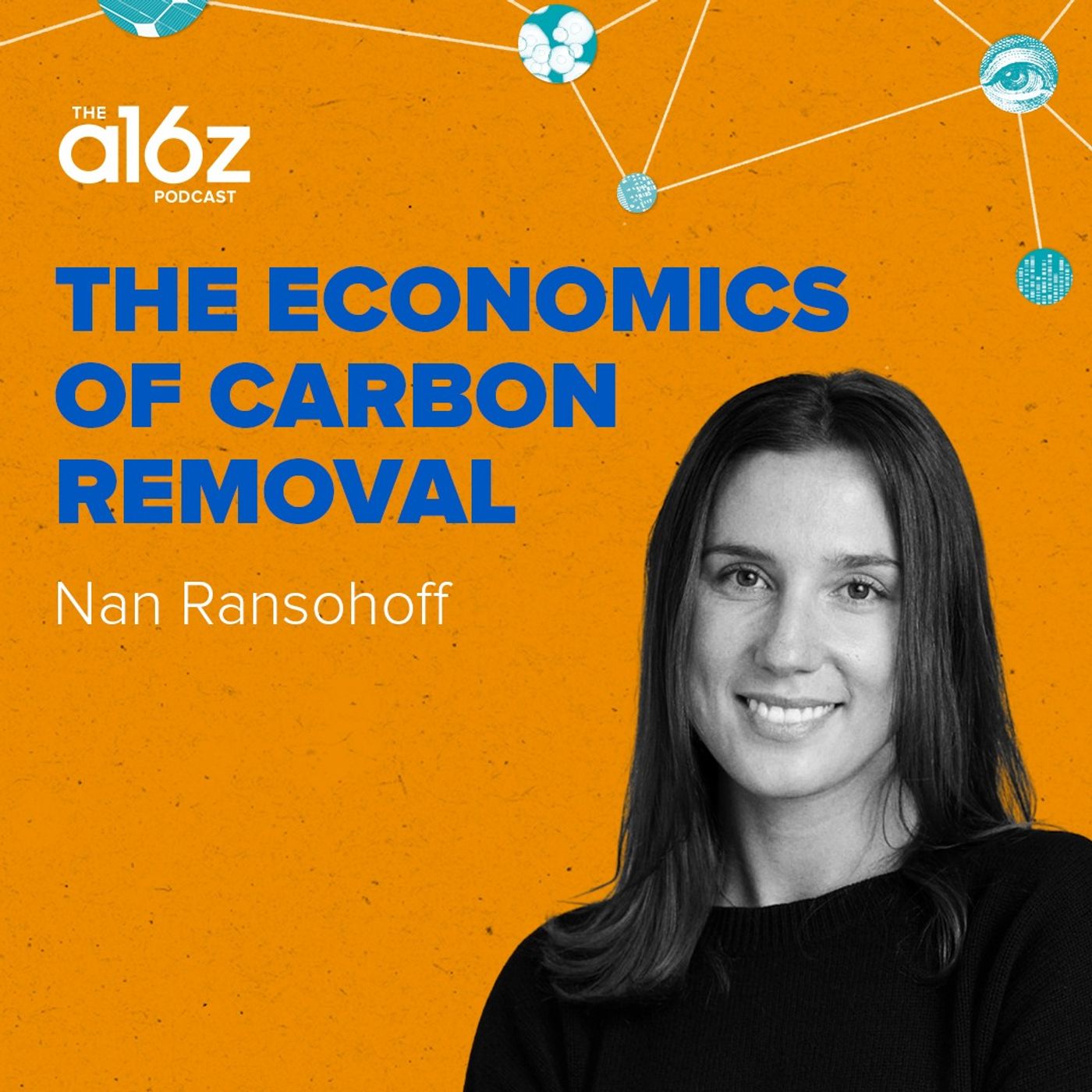 The Economics of Carbon Removal with Nan Ransohoff
The Economics of Carbon Removal with Nan RansohoffFrom 🇺🇸 a16z Podcast, published at 2022-11-30 14:00
What happens when there’s demand for a solution that doesn’t quite exist yet? Today, we bring on Nan Ransohoff to talk about this exact problem as it relates to carbon removal, and how Frontier — the initiative out of Stripe that she is leading – is using a nearly $1B advance market commitment to try to jumpstart this market. If you don’t know what that means, don’t worry – we’ve got you covered. Throughout the episode, we discuss the multivariate carbon equation and why emission reductions are not enough, the difference between offsets and permanent removal, who’s paying for tons today, what solutions already exist and how Frontier is vetting them, moving down the cost curve, where policy fits in, and ultimately what success might look like in this nascent industry. This is part 1 of our 3-part series on carbon removal. Look out next week for part 2 and part 3, where we dive into a growing marketplace for carbon and showcase several carbon removal solutions.
-
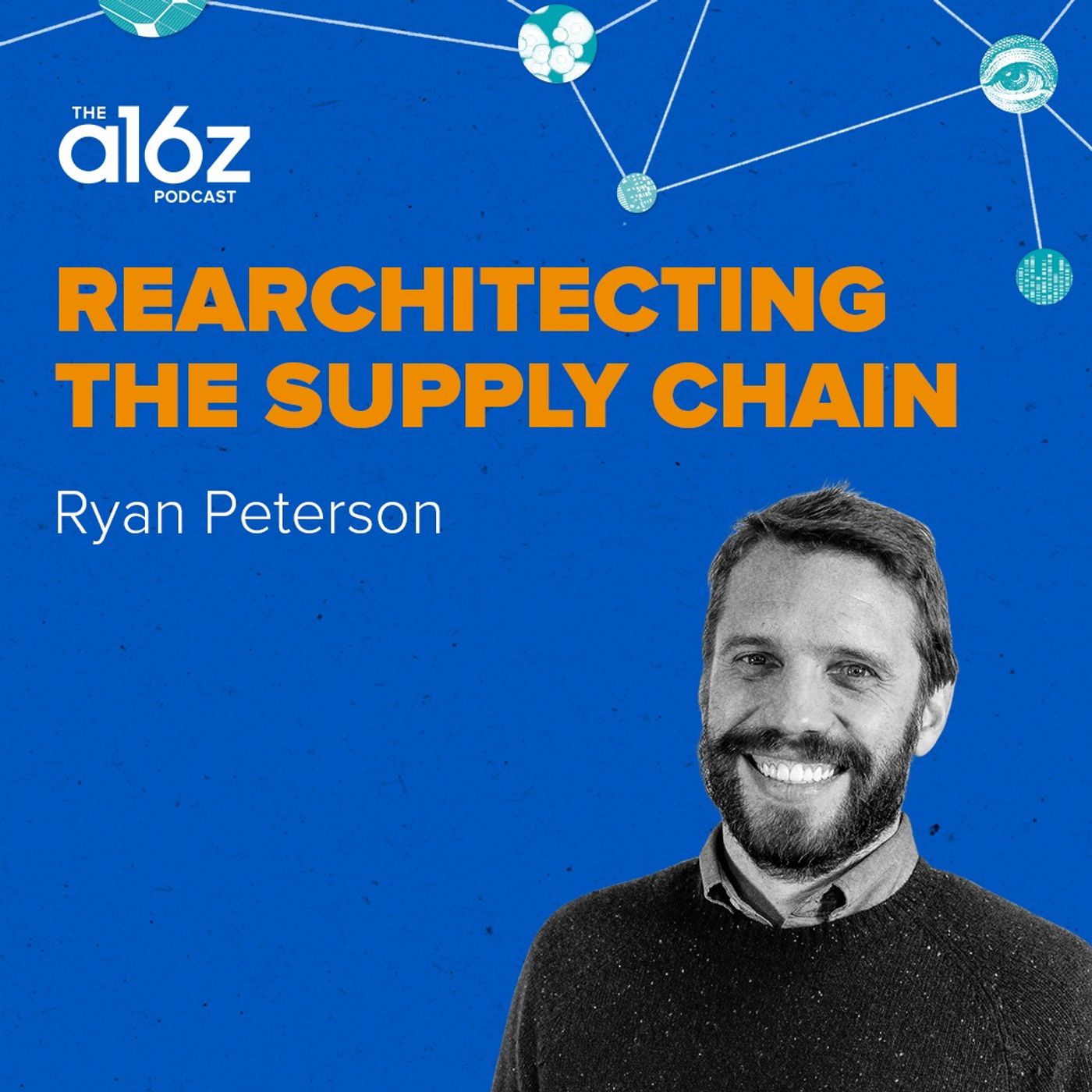 Ryan Petersen on Rearchitecting the Supply Chain
Ryan Petersen on Rearchitecting the Supply ChainFrom 🇺🇸 a16z Podcast, published at 2022-11-24 11:00
In today’s episode, we have a special treat. Flexport’s co-CEO and Founder, Ryan Petersen, chats with a16z Growth Editor Das Rush. They start with the question of why Ryan has chosen – of all the problem spaces to work on – improving the resiliency of the supply chain. They cover just how complex the supply chain is in the era of ecommerce, evolving customer expectations, and ultimately how we can rearchitect our supply chain to meet them. Given the holiday shopping coming up, you won’t want to miss this.
